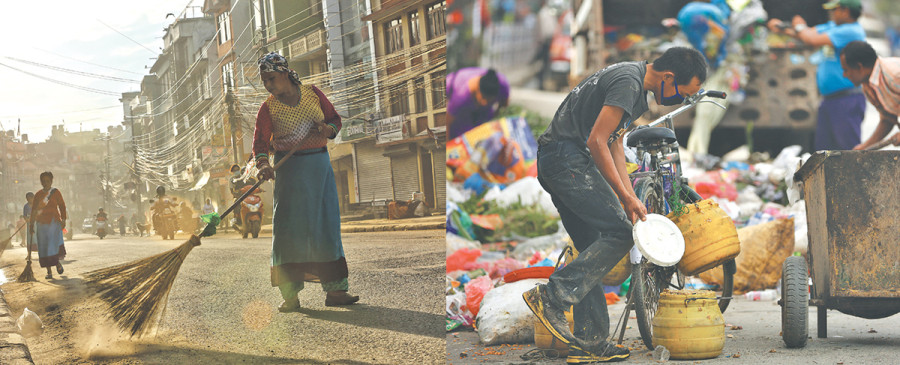Miscellaneous
Unsung heroes
Kathmandu might get a bad rap for being repugnantly dirty, but without these unsung heroes—with yesterday’s dreams still lodged in their minds—it wouldn’t be very liveable.
Milan Poudel
Photos and Text: Milan Poudel
At 4:30 am, as the rest of the city is sound asleep, 33-year-old Jay Kumar Subedi is already reporting at his work place—the municipality’s garbage transport station at Teku. With yesterday’s dreams still lodged in his mind, he starts his tripper for yet another morning hauling Kathmandu’s trash. He is one of the 65 drivers who make rounds of the Capital, bringing its waste to the dumping grounds at Teku.
Today, he has been assigned to Gaushala—one of the 35 routes the drivers operate on. There, Shivalal Deula and his team are already on site—shovels in hand. Deula is one of the hundreds of auxiliary workers who help shovel trash collected at designated zones into the municipality trippers. Deula has been employed with the municipality for 20 years and says the clean-up takes up to four hours every morning. Though happy with his work, the 54-year-old man does have a bone to pick with Kathmandu’s residents, “People just want to keep their houses clean,” he says, “If only they treated public places the same way, our lives would have been much easier.”
Binod Poddar, 44, and his son Dil Kumar, 16, are at Gaushala this morning as well. The father-son duo are rummaging through the trash Deula is hauling, hoping to find something of value. Plastic bottles, cardboard, metal, aluminium cans and glass bottles are all fair game. They are hoping to bag Rs 400 from their scavenging this morning.
Once the tripper has been loaded it makes its way back to Teku, awaiting transport to the dumping grounds at Sisdol, Nuwakot—25 km from the Valley. Here, among the stray dogs and the crows overhead, Pushkar Sapkota is idling in the same bulldozer he has been operating for the past 23 years. Sapkota has an infectious personality and a booming raspy voice and insists against working with a face-mask on, despite the overpowering stench of rotting garbage. “I don’t wear masks because it shows I don’t like my work and hesitate being at my workplace,” he says.
Yet, despite his defiance, Sapkota is well aware that he and his colleagues are working at the front-lines. You would think that those employed in an occupation as potentially hazardous as waste management would have set protocols and safety procedures, but Sapkota says employees are still waiting on just a promise of raincoats, boots and gloves. Health insurance is a far cry.
A monsoon cloud rumbles into the valley as Sapkota cranks up the bulldozer and inches it towards a pile of trash. The garbage transport site at Teku is operational 365 days a year, with workers turning up even during Dashain and Tihar. “While the rest of the city is cleaning the meat off a goat, we are cleaning the bones from the streets,” says Sapkota matter-of-factly.
Kathmandu might get a bad rap for being repugnantly dirty, but without these unsung heroes—with yesterday’s dreams still lodged in their minds—it wouldn’t be very liveable.














 14.24°C Kathmandu
14.24°C Kathmandu










